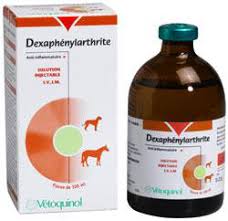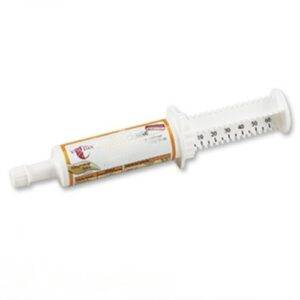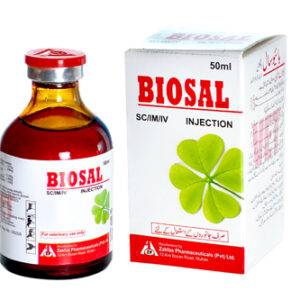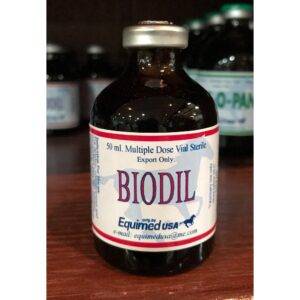Dexaphenylarthrite Injection Solution
Dexaphenylarthrite Injection Solution is a veterinary medication primarily used to treat inflammatory and allergic conditions in animals, particularly those affecting the joints and musculoskeletal system. This injectable solution typically combines dexamethasone (a corticosteroid) with phenylbutazone (a non-steroidal anti-inflammatory drug or NSAID). The combination of these two drugs makes dexaphenylarthrite vetoquinol highly effective for managing both inflammation and pain in various animals, particularly horses. dexaphenylarthrite for sale
Here’s a detailed overview of Dexaphenylarthrite Injection Solution:
Key Components:
Dexamethasone:
A powerful corticosteroid that provides anti-inflammatory and immunosuppressive effects. It helps reduce swelling, pain, and immune system overactivity. dexaphenylarthrite for sale
Phenylbutazone:
A non-steroidal anti-inflammatory drug (NSAID) commonly used in veterinary medicine to reduce pain, fever, and inflammation, especially in horses. It primarily works by inhibiting the production of prostaglandins, which are chemicals that mediate inflammation and pain.
Uses of Dexaphenylarthrite Injection Solution:
Joint and Musculoskeletal Conditions:
Effective in treating conditions like arthritis, joint inflammation, and other musculoskeletal injuries in horses, dogs, and other animals.
Inflammatory Disorders:
Used to manage general inflammatory conditions that can arise from various causes, including trauma, surgery, or chronic degenerative diseases. dexaphenylarthrite vetoquinol
Pain Management:
Provides effective pain relief for animals suffering from acute or chronic conditions affecting the muscles and joints.
Fever Reduction:
Phenylbutazone’s antipyretic (fever-reducing) properties help manage elevated body temperature caused by infections or inflammation.
Allergic Reactions:
Dexamethasone helps in the treatment of allergic reactions, such as skin allergies, respiratory allergies, and hypersensitivity reactions.
Mechanism of Action:
Dexamethasone: Reduces inflammation by inhibiting the production of inflammatory mediators such as prostaglandins and cytokines. It also suppresses the immune system, making it effective in autoimmune disorders.
Phenylbutazone: Works by inhibiting the enzyme cyclooxygenase (COX), which is responsible for the formation of prostaglandins. Prostaglandins play a key role in producing inflammation, pain, and fever, so their inhibition provides relief from these symptoms.
Dosage and Administration:
The dosage and frequency of administration will depend on the species of the animal, the condition being treated, and the veterinarian’s judgment.
Typically, the injection is administered intramuscularly (IM) or intravenously (IV).
Horses: Phenylbutazone doses for horses are typically 1-2 grams per day, but Dexaphenylarthrite doses should be tailored according to the animal’s condition and the veterinarian’s prescription. Dexamethasone doses may range from 2-10 mg depending on the severity of the condition.
Side Effects:
While Dexaphenylarthrite is effective, it carries the potential for side effects, particularly with long-term or high-dose use:
Gastrointestinal Issues:
The combination of corticosteroids and NSAIDs increases the risk of gastrointestinal ulcers and irritation. Phenylbutazone, in particular, is known for its ulcerogenic potential, especially in horses.
Kidney and Liver Damage:
Long-term use of phenylbutazone can lead to liver and kidney damage, particularly in older animals or those with pre-existing kidney or liver issues. dexaphenylarthrite for sale
Suppression of the Immune System:
Dexamethasone suppresses immune function, which can make animals more prone to infections. It can also delay wound healing.
Increased Thirst and Urination:
A common side effect of corticosteroids like dexamethasone, leading to polyuria (increased urination) and polydipsia (increased thirst). dexaphenylarthrite vetoquinol
Laminitis in Horses:
Corticosteroids like dexamethasone can increase the risk of laminitis, a serious condition affecting the hooves, particularly in horses with a history of this disease.
Adrenal Suppression:
Long-term use of corticosteroids can suppress the adrenal glands’ ability to produce natural cortisol, leading to adrenal insufficiency. It’s important to taper off the drug rather than stopping abruptly to avoid this condition.
Electrolyte Imbalance:
Dexamethasone can lead to imbalances in electrolytes such as sodium and potassium, which may affect heart and muscle function.
Contraindications:
Pre-existing gastrointestinal ulcers: Since both dexamethasone and phenylbutazone can increase the risk of ulcers, Dexaphenylarthrite should not be used in animals with known ulcers.
Renal or liver disease: Phenylbutazone can exacerbate kidney and liver problems, so it should be used with caution in animals with these conditions.
Diabetes: Dexamethasone can raise blood glucose levels, which is problematic for diabetic animals.
Pregnancy: Dexamethasone may induce labor or affect fetal development, so it should be avoided in pregnant animals unless absolutely necessary.
Infections: Dexamethasone can suppress immune function, making infections harder to fight off.
Drug Interactions:
NSAIDs: Phenylbutazone should not be combined with other NSAIDs due to an increased risk of gastrointestinal ulcers.
Diuretics: Corticosteroids can cause electrolyte imbalances, and using them with diuretics may exacerbate these issues.
Vaccines: Dexamethasone may reduce the effectiveness of vaccines by suppressing the immune response, so vaccinations should be avoided during corticosteroid therapy when possible.
Precautions:
Monitoring: Animals receiving long-term Dexaphenylarthrite treatment should be regularly monitored for signs of gastrointestinal distress, liver or kidney problems, and changes in behavior.
Tapering: If corticosteroids have been used for a long period, the dose should be gradually reduced to prevent adrenal insufficiency.
Water Intake: Ensure the animal has access to plenty of water, as corticosteroids can increase thirst.
Storage:
Store in a cool, dry place away from direct sunlight. Avoid freezing and keep out of reach of children and animals.
Conclusion:
Dexaphenylarthrite Injection Solution is a powerful treatment for managing pain, inflammation, and allergic conditions in veterinary practice. Its combination of dexamethasone and phenylbutazone provides a dual-action approach to reducing inflammation and managing pain. However, due to the risk of serious side effects, especially with long-term use, it must be used under the guidance of a veterinarian, with close monitoring for potential complications. dexaphenylarthrite vetoquinol, dexaphenylarthrite for sale





Reviews
There are no reviews yet.